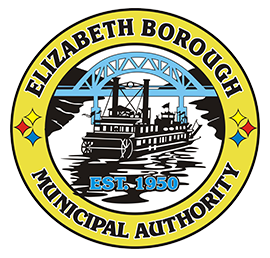Sewers
1.What do I do if I have a sewer backup?
If you are experiencing a sewer backup, call the EBMA at 412-384-3686 during office hours or Elizabeth Borough Police after office hours at 412-384-7771.
Several questions to consider when determining the possible cause of a sewer problem/stoppage are:
- Is the problem with an individual fixture such as a kitchen sink?
If so, attempt to clear the blockage yourself or contact a registered plumber/sewer drain cleaner. - Is the problem with a commode located above the lowest floor of the building/home?
If yes, attempt to clear the blockage yourself or contact a registered plumber/sewer drain cleaner. - Is the problem with the lowest facility (toilet, shower, floor drain, or laundry tub in the building/home?
If yes, contact EBMA to investigate. - Is the service backing up constantly, even when the occupants on the premises are not using the facilities?
If yes, contact EBMA to investigate.
When a service is backing up only when the occupants are using their facilities, or the problem is not in the lowest level plumbing fixtures, we suggest you contact registered plumber or sewer drain cleaner. For assistance with the problem. If you are unsure, please contact EBMA for assistance.
- Is the problem with an individual fixture such as a kitchen sink?
2. What is a sewer lateral?
Service laterals are generally 4” or 6” clay or PVC pipe for residential structures, that run from the structure to the main sewer line.
3. What portion of the sewer lateral am I responsible for?
Customers are responsible for the section of sewer line starting at the tap connection on the main sewer line up to the structure. The lateral may extend across roadways to reach the EBMA main sewer line, but it is still the responsibility of the home/building owner.
4. Whom should I call about a sewer odor?
A problem in the main line or service lateral can cause a sewer odor, even if a backup is not occurring. Gases can escape through manhole covers or the drains in homes or buildings. Unless the odor is isolated to one fixture or in an upper bathroom only, call EBMA to investigate the odor.
5. How to do I prevent sewer odors?
Turn on your water and run for 15-20 seconds. This ensures that there is water in the plumbing fixture traps.
Add approximately 2 cups of water to your floor drain periodically. The water evaporates from the floor drain leaving it dry, which can let sewer gas from the service lateral or main line back into the house/building causing an odor problem.
If you are leaving for an extended period, make sure the toilets, fixture traps, and floor drains have water in them.
6. What is a sewer clean-out and where is it located?
A clean out is a place when access to the service lateral is available to clear the lateral of obstructions. It can be located either inside or outside of a house/building. If it is inside the house/building, it is commonly referred to as a stack plug. EBMA does not maintain any cleanout located in a house/building or the service lateral. They are the responsibility of the house/building owner.
7. What is manhole and where is it located?
EBMA uses manholes to access the main sewer lines for inspection, cleaning, and maintenance. Manholes are usually located in the street, right of way, or a utility easement.
8. Whom do I contact about a loose, broken, or missing manhole cover?
Call the EBMA at 412-384-3686 with the exact location of the manhole and if possible, the approximate size of the cover/opening.
Leaks
1. I think I have a water leak causing excess charges on my sewer bill. What should I do?
- Check for leak at your water meter
Turn off all water using appliances and fixtures. Then locate the small leak detection triangle that is located on the dial of the water meter. If this triangle is rotating (even very slightly), there is a water leak.
- Check for leaks in toilets
Toilet leaks can be detected by adding a few drops of food coloring to the water in the toilet tank. Leave the food coloring in the tank for at least ten minutes. If colored water appears in the toilet bowl, the toilet is leaking.
- Check for leaks at your fixtures
Make sure all fixtures (Faucets, showerheads, etc.) are completely turned off. If any of these are dripping (even very slightly), there is a water leak and should be repaired.
- Check for leak at your water meter
Dye Testing
1. Is a dye test required if I am selling my property?
Currently dye testing is not required for properties located in Elizabeth Borough because it is still a combination sewer system.
